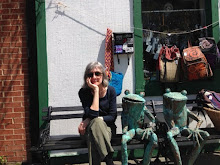Wavy Gravy was, and continues to be, a serious social activist and philanthropist as well as a very funny clown. In his 70s now, he is perhaps best known for his role as m.c. at Woodstock 40 years ago. Many of his impromptu statements back then became enshrined as 60s slogans.
My favorite: “We’re all bozos on this bus, so we might as well sit back and enjoy the ride.”
Believe it or not, this is one of the deepest messages of the Jewish holy day Yom Kippur: We are stumbling, bumbling, goofy human beings. We keep trying, and we keep falling on our faces, and it’s all okay. We’re doing the best we can. And we’re all on the same bus, together.
But as Elizabeth Lesser writes in her wonderful book “Broken Open,” the source of our suffering is that we keep imagining that there is some other bus on which the passengers are all healthy, happy, gorgeous, and well-dressed! But that’s an illusion, and Yom Kippur is about shattering illusions. We are all just lovable, flawed bozos on this bus called Life, and we all know where the bus is ultimately headed... and it’s all okay.
Acknowledging on Yom Kippur that we are all flawed, we symbolically draw the circle of “we” large enough to include even ourselves in the possibility of forgiveness. No one is to be left out of the circle on this day of wiping the slate clean and uncovering our pure souls.
The Jewish tradition has much to say on the subject of brokenness. For example, in Psalm 34 we hear: “God is near to those who have a broken heart, and saves those who have a crushed spirit.” Being human, we are each of us broken in our own way. Broken, and beautiful.
A friend once taught me about the Japanese artistic style and worldview known as wabi sabi. The term refers to beauty manifest in objects that are imperfect, impermanent, and incomplete... acknowledging three simple realities: nothing lasts, nothing is finished, and nothing is perfect.
That’s us! Each of our hearts is wabi sabi. If we could recognize it in one another, as well as in ourselves, perhaps we could all lighten up a bit and enjoy our ride together on this bus of life marked BOZOS.
My favorite: “We’re all bozos on this bus, so we might as well sit back and enjoy the ride.”
Believe it or not, this is one of the deepest messages of the Jewish holy day Yom Kippur: We are stumbling, bumbling, goofy human beings. We keep trying, and we keep falling on our faces, and it’s all okay. We’re doing the best we can. And we’re all on the same bus, together.
But as Elizabeth Lesser writes in her wonderful book “Broken Open,” the source of our suffering is that we keep imagining that there is some other bus on which the passengers are all healthy, happy, gorgeous, and well-dressed! But that’s an illusion, and Yom Kippur is about shattering illusions. We are all just lovable, flawed bozos on this bus called Life, and we all know where the bus is ultimately headed... and it’s all okay.
Acknowledging on Yom Kippur that we are all flawed, we symbolically draw the circle of “we” large enough to include even ourselves in the possibility of forgiveness. No one is to be left out of the circle on this day of wiping the slate clean and uncovering our pure souls.
The Jewish tradition has much to say on the subject of brokenness. For example, in Psalm 34 we hear: “God is near to those who have a broken heart, and saves those who have a crushed spirit.” Being human, we are each of us broken in our own way. Broken, and beautiful.
A friend once taught me about the Japanese artistic style and worldview known as wabi sabi. The term refers to beauty manifest in objects that are imperfect, impermanent, and incomplete... acknowledging three simple realities: nothing lasts, nothing is finished, and nothing is perfect.
That’s us! Each of our hearts is wabi sabi. If we could recognize it in one another, as well as in ourselves, perhaps we could all lighten up a bit and enjoy our ride together on this bus of life marked BOZOS.
